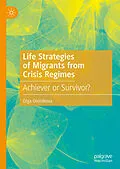'This innovative study explores the lives of migrants leaving a crisis-torn homeland and re-establishing themselves in a new country. This book provides a fresh methodological approach that can be applied in a range of studies and which illuminates the complexity of 21st-century migration.'
-Catriona Elder, Associate Professor of Sociology, University of Sydney, Australia
'This book makes an important contribution to the field of migration by centering the concept of life strategies. Drawing on rich material and original insights, it has a clear authorial voice and confidently combines both quantitative and qualitative approaches in its coherent analysis.'
-Karen O'Reilly, Professor Emeritus of Sociology, Loughborough University, UK
'Oleinikova contributes significantly to the theory of life strategies as well as to the methodology of its investigation. The main novelty is the model outlining the dialectic vision of individual life strategies, which allows the author to explain personal transformations and adaptations at individual and social levels before, during and after migration.'
-Olga Kutsenko, Professor of Social Inequalities and Collective Behavior, Taras Shevchenko National University of Kyiv, Ukraine
This book offers a profoundly new examination of life strategies of migrants from regimes in crisis. By focusing on the unique paired comparison of two opposing life strategies-the dynamic, risk-taking and future-oriented 'achievement life strategy' and the conservative, risk-minimizing and survival-oriented 'survival life strategy'-this volume takes migration from post-independence Ukraine to Australia as a central case study to show how people shape their lives in response to regime transitions and crises; what life strategies individuals pursue to cope with social change; and why these individuals chose migration to Australia. Ultimately, the book compels us to reassess what we meanby migration and regime crisis in order to adequately respond to the global challenges confronting numerous democracies today. As such, it will appeal to scholars of sociology and politics with interests in migration, political theory and democracy.
Autorentext
Olga Oleinikova is Lecturer and Director of the Ukraine Democracy Initiative in the School of Communication at the University of Technology Sydney, Australia.
Zusammenfassung
This book offers a profoundly new examination of life strategies of migrants from regimes in crisis. By focusing on the unique paired comparison of two opposing life strategiesthe dynamic, risk-taking and future-oriented 'achievement life strategy' and the conservative, risk-minimizing and survival-oriented 'survival life strategy'this volume takes migration from post-independence Ukraine to Australia as a central case study to show how people shape their lives in response to regime transitions and crises; what life strategies individuals pursue to cope with social change; and why these individuals chose migration to Australia. Ultimately, the book compels us to reassess what we mean by migration and regime crisis in order to adequately respond to the global challenges confronting numerous democracies today. As such, it will appeal to scholars of sociology and politics with interests in migration, political theory and democracy.
Inhalt
Part One - Concepts and Contexts
Chapter 1. Life Strategy, Migration and Regime Transition
1.1. Life Strategy and Migration
1.2. Regime Transition: from Western to post-Soviet East European Perspectives
1.3. Conceptualising Life Strategy
Chapter 2. Life Strategy Research Framework
2.1. Conceptual Framework
2.2. Mapping Mixed Methodology
Part Two Leaving Europe
Chapter 3. Leaving the Regime in Crisis: Structural Context Shaping Life Strategies
3.1. Economic Situation
3.2. Political Situation
3.3. Migration Dynamics
Chapter 4. Why Migration? Individual Context of Survival and Achievement
4.1. Leaving for Survival: Aims, Values, Needs, Agency
4.2. Leaving for Achievement: Aims, Values, Needs, Agency
Chapter 5. Migration Pathways: Popular Visas, Streams and Tactics
5.1. Survival Pathways: Humanitarian and Family Reunion Stream
5.2. Achievement Pathways: Skilled and Marriage Migration Streams
Part Three Becoming Australian
Chapter 6. 'Survival Migrants': Challenges and Opportunities
6.1. Survival Occupational Experiences
6.2. Class Mobility
6.3. Adaptation: Maximising Profits, Minimising Integration
6.4. National Identity, Emotions and Life Strategy Shifts
Chapter 7. Patterns of 'Achievement'
7.1. Migration Dividends
7.2. Occupational Experiences: Anchor and Bricolage Careers7.3. Successful Integration and Australian Identity
7.4. Future Plans Aimed at Achievement
Part Four Achievers vs. Survivors: Comparative Perspective
Chapter 8. Achievers vs. Survivors: Dynamics and Trends
8.1. Two Life Strategy Profiles8.2. Life Strategy Model: Research Limitations and Future Research
8.3. Concluding Remarks
